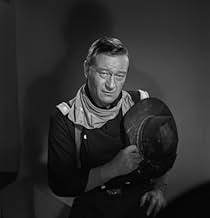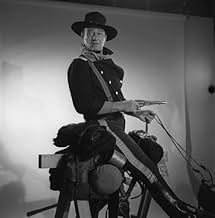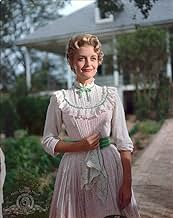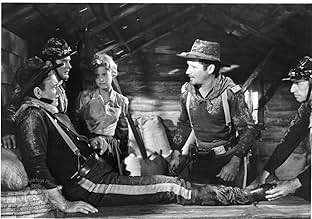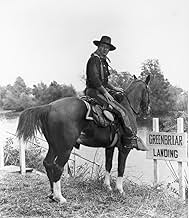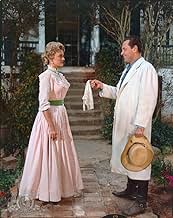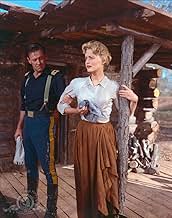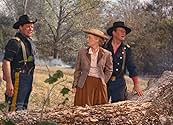En 1863, un batallón de La Unión debe hacer una incursión tras las líneas confederadas en Mississippi para destruir los ferrocarriles enemigos, pero una bella prisionera sureña y el médico d... Leer todoEn 1863, un batallón de La Unión debe hacer una incursión tras las líneas confederadas en Mississippi para destruir los ferrocarriles enemigos, pero una bella prisionera sureña y el médico de la unidad causan tensiones dentro de las filas.En 1863, un batallón de La Unión debe hacer una incursión tras las líneas confederadas en Mississippi para destruir los ferrocarriles enemigos, pero una bella prisionera sureña y el médico de la unidad causan tensiones dentro de las filas.
- Dirección
- Guionistas
- Elenco
- Premios
- 1 nominación en total
- Dirección
- Guionistas
- Todo el elenco y el equipo
- Producción, taquilla y más en IMDbPro
Opiniones destacadas
Ford's battle scenes are as usual patriotically free of blood and require no reflection but the imagery is great (you want to join the cavalry) and the detail outstanding. We hear the clanking of canteens and cookpots, an argument over the placement of latrines and see the only filmic presentation of the making of Sherman Neckties (warped rails). The Ford family is well represented though we miss Harry Carey Jr (and Paul Fixx must have been tied up with the Rifleman).
If we had to have a love interest, Maureen Ohara could have at least tied this to "Rio Grande" and furthered the Ford library.
Normally wonderful Bill Holden has only brief bright moments and is mostly going through the motions and hung-over here. Neither Wayne nor Ford were slouches when it came to curling whiskey but by his own admission Holden aggravated all and threatened production with reckless, drunken extracurriculae, breaking an arm falling from a bridge.
This film was an inspiration in grade school and a guilty pleasure since.
John Ford always disparaged the films he made after Wings of Eagles, but in my opinion, The Horse Soldiers is one of his finest films. Also in my humble opinion he managed to get one of John Wayne's finest film performances. Wayne's a volunteer officer, in civilian life he rose from section hand on a railroad to an construction engineer. Holden calls him "section hand" as a term of derision after Wayne consistently refers to him as "croker."
Wayne and Holden were very close personal friends and friendly rivals at the box office. That's part of the reason that The Horse Soldiers is so good, the chemistry between them. In fact when Wayne died in 1979, Holden was said to have gone on one legendary drinking binge. Who would have suspected we'd have lost him as well two years later.
Holden as the doctor has a less flamboyant part than Wayne, but he makes the most of what he was given. I suspect knowing the relationship between Wayne and John Ford, he knew going in his part would be less, but he did it anyway.
Anyone who thinks John Wayne incapable of acting should see the scene in the saloon at Newton's Station after the Union forces repel a Confederate attack and are about their business destroying the railroad property. In a great drunk scene he reveals to Constance Towers the reason for his hatred of the medical profession. I won't reveal it, but it's something we can all understand. Wayne did this scene so well that Ford used an abbreviated version of it in The Man Who Shot Liberty Valance.
Ford makes marvelous use of music in there, weaving traditional Civil War era songs with the song written by Stan Jones for the film, I Left My Love. That is one catchy and infectious ballad, one of the best things written for a John Ford movie. Incidentally Stan Jones makes a brief appearance in the film as Ulysses S. Grant and does well by him.
There are two in the supporting cast that deserve mention. During the Civil War Lincoln had to deal with volunteer political generals, most of whom were a flop. Willis Bouchey playing John Wayne's co-commander in the expedition captures the phenomenon to perfection. He's argumentative, arrogant, and a general pain in the butt to Wayne. It's probably Bouchey's finest screen performance.
And Carleton Young also gives what I think is his finest screen performance as the one armed Confederate colonel who tries in vain to stop Wayne from completing his plans. It's a role that requires dignity and strength and Carleton Young is marvelous. In fact the contrast between Bouchey and Young as soldiers is pretty obvious.
The relationship between the Section Hand and The Croker evolves during the running time of The Horse Soldiers. It's a relationship well worth seeing develop.
In PRISONER OF SHARK ISLAND he dealt with the story of Dr.Samuel Mudd, who was sentenced to life imprisonment for involvement in Lincoln's Assassination. In HOW THE WEST WAS WON, Ford did the segment dealing with the battle of "SHILOH", with Harry Morgan as General Grant and John Wayne as General Sherman. This film was the nearest that Ford ever got to his dream film. THE HORSE SOLDIERS was the only film that was devoted to a full study of the effect of the war in the South, on both Union and Rebel soldiers. While not, perhaps, the best that Ford could have achieved - he was in the twilight of his master career - it is a fine film none-the-less.
The story is based on an incident in 1863 known as Grierson's Raid. Cavalry leader Benjamin Grierson was sent by Grant into Alabama and Mississippi on a raid to attack a railway junction, supposedly to destroy it for strategic reasons. While it was important to knock the railway junction out of effective work, the real purpose was to tie up Confederate forces in these backwaters. Since December 1862 Grant was struggling to capture the city of Vicksburg, Mississippi, the last major Confederate stronghold on the Mississippi River. But try as he did Grant kept losing to the Confederates under Joseph Johnston and John C. Pemberton (the commander in Vicksburg). But Grant had noticed how Confederate cavalry men like Earl Van Dorn and Nathan Bedford Forrest had forced him to use men to protect his supply lines, and took valuable time away from him trying to fight off or track them down. He decided that Grierson, a first rate Cavalry leader, could do the same thing to Johnston. A very intelligent Confederate Commander, Johnston was nervous at unexpected difficulties. Grant reasoned that Grierson's men would panic Johnston, and cause him to waste time chasing him down.
As it turned out Grierson's Raid worked. The pinning down of large numbers of Rebel troops in Alabama and Missisippi was wonderful for Grant's Vicksburg campaign. It was the beginning of the successful conclusion of the campaign, as Johnston's attention was now split between trying to help support Pemberton and trying to reassure frightened southern populations in the hinterlands. Grierson got most of his men back to Northern lines. Vicksburg was able to hold out until July 4, 1863. It's fall (the day after Lee's defeat at Gettysburg) really marked the beginning of the end of the Civil War.
This incident is the basis for THE HORSE SOLDIERS. Ford concentrates on what the experience of the war must have been like in the Southern countryside. Certain things are taken from other incidents and battlefields. When a military school's cadets are brought into the field to try to catch or slow down John Wayne's men, Ford is really picking up on an incident in the war in Virginia, when the young cadets at the Virginia Military Institute came out to fight the Union troops under Sheridan in 1864. One can forgive the transition of the incident.
It has been pointed out that one of the characters, Colonel Secord (Willis Bouchey) is a splendid type - the political officer. Men like Secord (usually in the position of General) bedeviled both sides, because of their usually normal level of mediocrity or idiocy. A few rose to the job well - the best of the Northern political generals was "Black Jack" Logan, who would be a valuable associate of Sherman in the battles around Atlanta. But for every positive General Logan, there were thieves like Benjamin "Spoons" Butler, who feathered his nest as military governor of New Orleans (he supposedly stole even the silver spoons of the citizenry). Actually Secord is normally intelligent, and follows Wayne's strategy. But he is constantly looking ahead at post-war elections. Towards the end he even wonders if the White House beckons.
Another lovely moment shows the fraying of the Southern cause. Wayne and his men come across two Rebel deserters (Strother Martin and Denver Pyle) who have tied up the local sheriff (Russell Simpson). Wayne thanks Martin and Pyle for their unofficial assistance to the Northern cause,telling them which way they plan to go. While Martin chatters away (mentioning the strength of Rebel forces in the area), Wayne carefully knocks out Pyle and then Martin, and then unties Simpson and assists in tying up the two deserters. William Holden is watching this, and later asks why he helped Simpson. Wayne explains that he decided to feed the deserters false information about his own movements, as they would probably give the information to the Confederates later on anyway.
All the performances are fine, with Wayne in particular as a man who hates doctors and medicine for a valid personal reason. Holden is in a subordinate role but he gets some nice moments. So does Constance Towers, in a rare leading part, as a passionate Confederate supporter who gradually gets to like Wayne. Carleton Young, as a former friend of Wayne, has a moment trying to rally Confederate forces at the railway depot.
It is a good Ford film, and makes one wish that Ford had made his Ulysses Grant biography.
Col. John Marlowe (John Wayne) is assigned to take a small brigade of cavalry from Tennessee, ride hundreds of miles into the Confederate territory and destroy the railroad at Newton Station, Mississippi, thereby cutting the supply line to Vicksburg... To do it, he will have to avoid all contact with rebel forces until he has reached his target...
The first problem Marlowe encounters is Major Hank Kendall (William Holden), an obstinate surgeon who will be accompanying the force... Marlowe has the expected contempt of the combat soldier for his colleague who carries no arms... In addition, when Kendall asserts his rights as an officer in the medical corps to declare unfit any soldier he considers so, Marlowe and Kendall clash...
The next problem is Marlowe's second in command, Col. Secord (Willis Bouchey), who makes no secret of his plans to use his military career to further his strong political ambitions...
The third problem is the high-spirited belle Hannah Hunter (Constance Towers). This violent Southern patriot gives him an initial hard time... The Yankee soldiers stay at her plantation soon after they cross into the Confederacy... When Hannah learns their plans, Marlow is forced then to take her along with them for security reasons...
Holden and Wayne (violently opposing strong personalities) perform their assignment with a consummate force, intensity, and expert teamwork... Constance Towers, too, registers a vital presence... At their first dinner, she passes Wayne a platter of chicken... As she leans over, threatening to divulge her engaging décolletage, she says: 'Oh come now, Colonel, a man with a great big frame like yours can't just nibble away like a little titmouse. Now what was your preference, the leg or the breast?'
Incorrigibly sentimental and romantic in his big cavalry epic, Ford's motion picture is full of heroic cavalry on the skyline imagery... Among the more affecting scenes is that in which a harsh compassionate Wayne comforts a dying young soldier and the one in which he registers his love for Towers... There is also a compelling sequence, pure John Ford, in which a group of teenage cadets march out from a Southern military academy to take on the enemy, which makes manifest to battle boys and pulls a retreat, leaving the kids cheering...
¿Sabías que…?
- TriviaThe film marked the beginning of mega-deals for Hollywood stars. John Wayne and William Holden received $775,000 each, plus 20% of the overall profits, an unheard-of sum for that time. The final contract involved six companies and numbered twice the pages of the movie's script. The film, however, was a financial failure, with no profits to be shared in the end.
- ErroresIn the shot right after Hank Worden throws the torch onto the cotton bales, look at the upper left of the screen. You will see an airplane flying from right to left.
- Citas
Miss Hannah Hunter: [bending over with a plate of chicken, revealing ample cleavage] Do you prefer the leg... or the breast?
Col. John Marlowe: I've had quite enough of both, thank you.
- ConexionesFeatured in Directed by John Ford (1971)
- Bandas sonorasI Left My Love
by Stan Jones
Selecciones populares
- How long is The Horse Soldiers?Con tecnología de Alexa
Detalles
Taquilla
- Total en EE. UU. y Canadá
- USD 1,753,526
- Tiempo de ejecución
- 2h(120 min)


